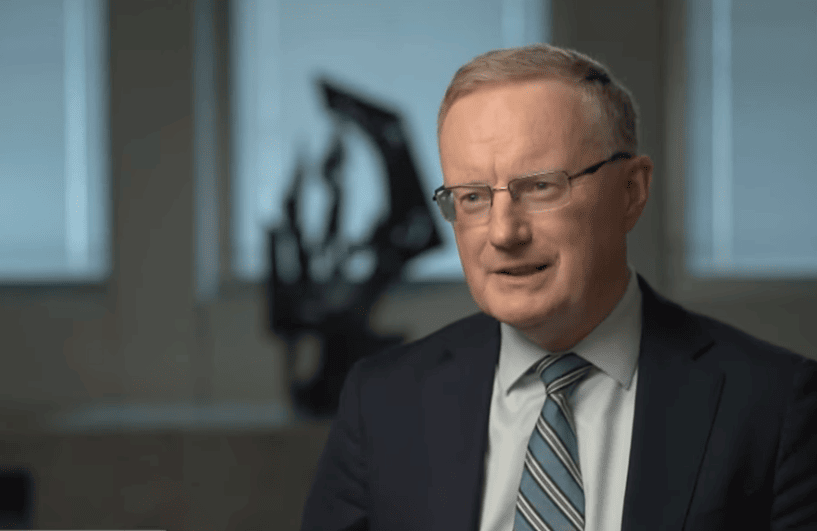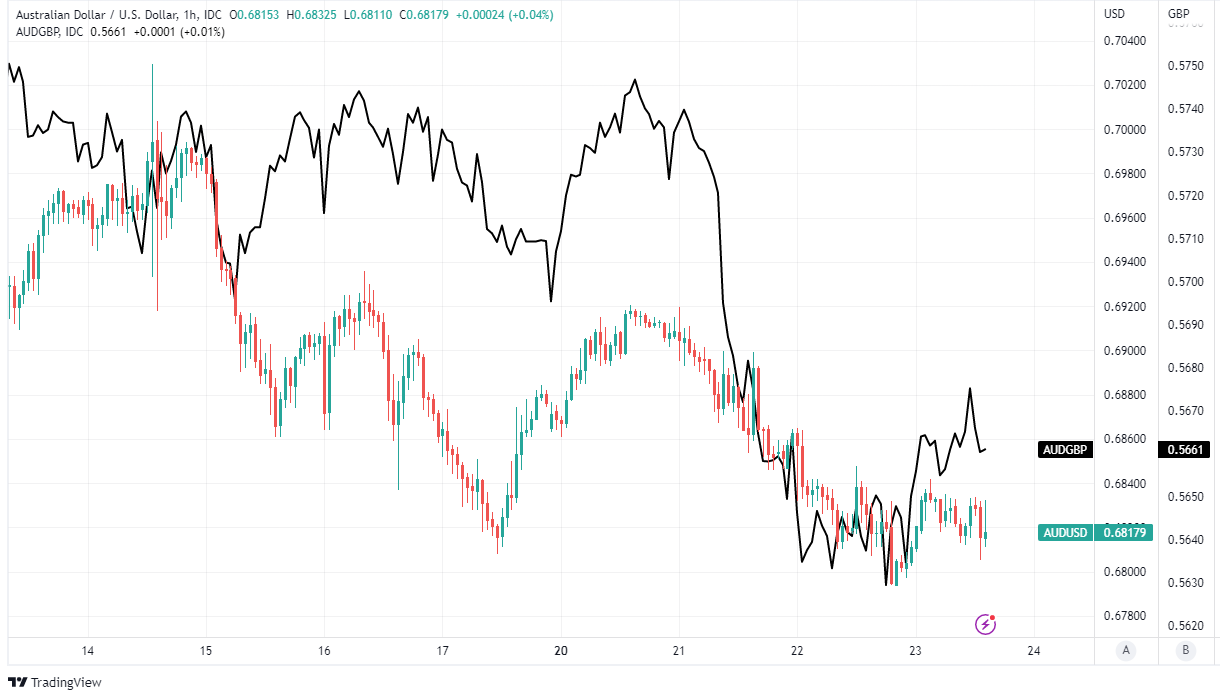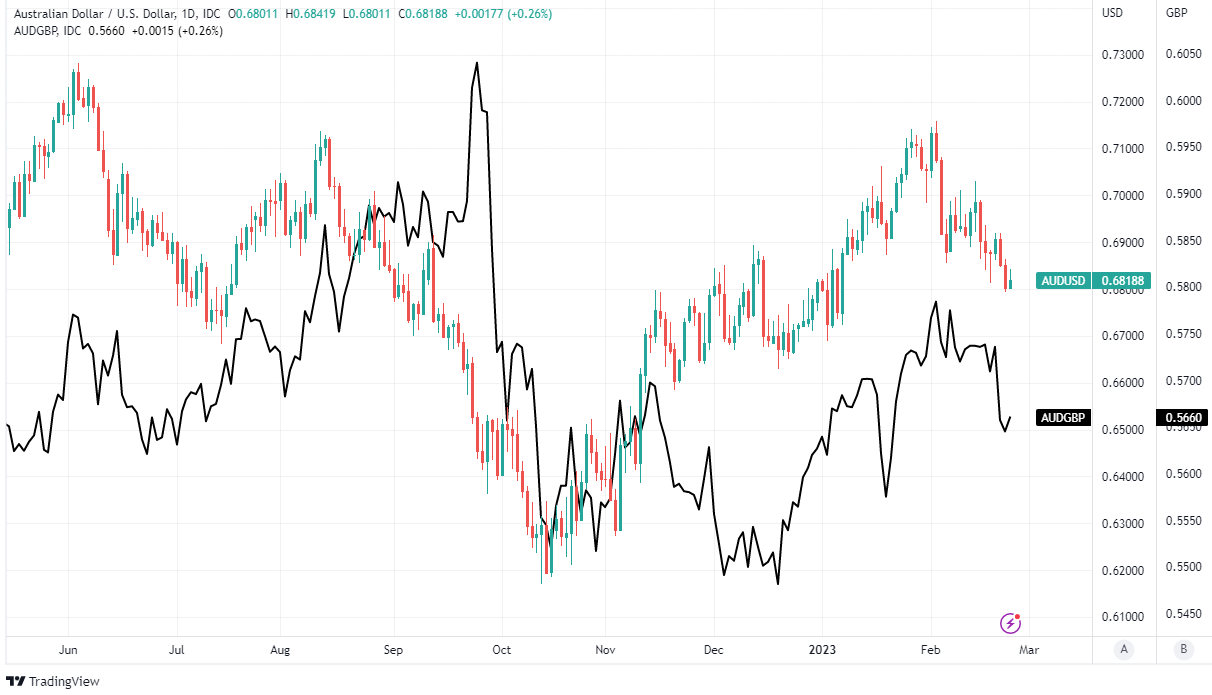Australian Dollar Risks Becoming Fallen Angel if RBA's Independence Lost
- Written by: James Skinner
"The the variable rate mortgage market in Australia and high levels of household indebtedness mean that the cash‑flow channel of monetary policy tightening is stronger here than elsewhere," - CBA.

Above: File image of RBA Governor Lowe, source: ABC. Image Pound Sterling Live.
The Australian Dollar rebounded from prior lows to outperform other major currencies in the penultimate session of the week but might risk becoming like a fallen angel if a pending change on the Reserve Bank of Australia (RBA) board leads the market to view its monetary policy independence as lost.
Three policymakers and rate-setters on the RBA's nine-seat board will see their present terms expire over the coming months but there are no limits to the number of terms that can be served by one member of the board, and so far only one job vacancy has been advertised.
The one vacancy is potentially ominous because there is only one member of the board whose future has been speculated upon widely within the press, and called into question by the current serving treasurer, who's the member of the government charged with deciding on these appointments.
This person is Governor Philip Lowe, currently the most tenured of all central bankers within the advanced economy universe, who has been charged like others elsewhere with failing to see coming the energy price surges of recent years and the resulting inflation process now underway.
"Some emerging market currencies are lagging as politicians start to resist high interest rates and question central bank independence," says Chris Turner, global head of markets and regional head of research for UK & CEE at ING.
 Above: AUD/USD shown at hourly intervals alongside AUD/GBP. Click image for closer inspection. To optimise the timing of international payments you could consider setting a free FX rate alert here.
Above: AUD/USD shown at hourly intervals alongside AUD/GBP. Click image for closer inspection. To optimise the timing of international payments you could consider setting a free FX rate alert here.
"The Israel shekel was hit hard on the news and the Israeli government has spent the rest of the week trying to re-affirm the independence of the central bank," Turner writes in a Thursday reference to the political fallout from Monday's interest rate decision in Israel.
No central banker anywhere is beyond scrutiny or criticism but it's normally only governments of 'emerging market' economies who would dismiss or replace the head of a central bank policy board for having raised interest rates as part of an effort to achieve an earlier defined inflation objective.
An inflation target might be viewed most commonly by governments as a simple macroeconomic policy tool but it is also a commitment to bondholders, hence why currencies tend to fall as bond yields rise anyway wherever commitments to such targets are called into question.
Compare GBP to AUD Exchange Rates
Find out how much you could save on your pound to Australian dollar transfer
Potential saving vs high street banks:
A$4,875.00
Free • No obligation • Takes 2 minutes
"The latest RBA minutes highlight that “a pause wasn’t considered” and that the case for 25bps (over 50bps) was stronger with the data suggesting more breadth and persistence in inflation than expected," says Bipan Rai, North American head of FX strategy at CIBC Capital Markets.
"We expect the RBA to hike twice more (in March and April) by 25bps," Rai and colleagues write in a Wednesday market commentary.
Thursday's job advertisement comes barely more than a month away from the end of an independent review into the Reserve Bank of Australia's policy and practices, and at a point when a recent softening of the labour market may be stoking public and political concerns about the RBA's interest rate policy.
 Above: AUD/USD shown at daily intervals alongside AUD/GBP. Click image for closer inspection. (If you are looking to protect or boost your international payment budget you could consider securing today's rate for use in the future, or set an order for your ideal rate when it is achieved, more information can be found here.)
Above: AUD/USD shown at daily intervals alongside AUD/GBP. Click image for closer inspection. (If you are looking to protect or boost your international payment budget you could consider securing today's rate for use in the future, or set an order for your ideal rate when it is achieved, more information can be found here.)
"Yes, the looming mortgage cliff in 2023 could prove a massive shock to the economy; no, it’s unlikely to be happening already," writes Michael Every, a global strategist at Rabobank, in a lighthearted daily market commentary.
"At least not when retail sales were booming the month before December and every anecdotal report is that if you can fog a mirror you can have a job; and the new Labor (stress LABOR) government is going to allow 300,000 permanent migrants in to fill critical skills gaps," he adds.
The RBA raised its cash rate to 3.35% earlier in February, making for a ninth increase since May 2022, and warned that "further increases in interest rates will be needed over the months ahead to ensure that inflation returns to target."
"There were two other interesting points from the Minutes; RBA noted that the cash rate was lower in Australia than other developed economies and that Australia’s excess pool of savings was estimated to higher than almost anywhere else in the world. This could also have added to the change in tone by the RBA about the need for higher interest rates in Australia," says Belinda Allen, a senior economist at Commonwealth Bank of Australia.
"But the variable rate mortgage market in Australia and high levels of household indebtedness mean that the cash‑flow channel of monetary policy tightening is stronger here than elsewhere," Allen writes in a review of minutes from February's policy meeting released earlier this week.
Compare GBP to AUD Exchange Rates
Find out how much you could save on your pound to Australian dollar transfer
Potential saving vs high street banks:
A$4,875.00
Free • No obligation • Takes 2 minutes




